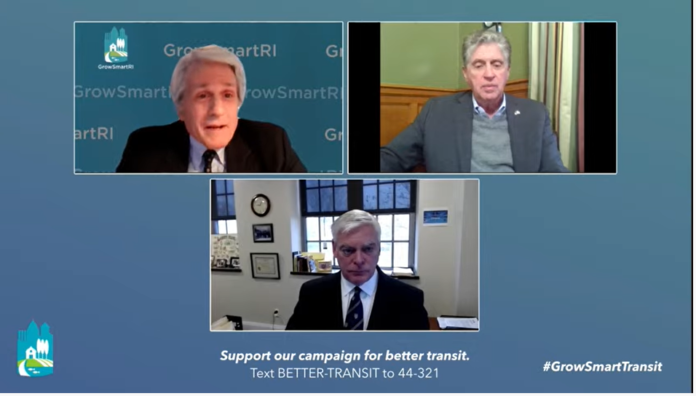
PROVIDENCE – Amid recent community debate over bike lanes and bus-hub improvements in the capital city, Gov. Daniel J. McKee is stressing the importance of consensus in improving the state’s transportation system.
“If it’s my way or the highway, nothing’s going to happen,” McKee said, speaking as part of a virtual transit forum hosted by Grow Smart Rhode Island on Friday.
The forum, which featured input from state and federal officials and activists, centered upon how the state can capitalize on historic federal transportation funding to complete the ambitious array of projects outlined in the Transit Forward 2040 state master plan.
But achieving any of these crucial transportation goals cannot be done without community input and consensus, McKee warned. He touted his administration’s role in helping reduce conflict over the Providence Multi-Hub Bus Plan for downtown.
After public outcry over the R.I. Department of Transportation’s original plan, which called for a series of three bus hubs split across downtown, two alternative proposals have since been added to the roster for community members to consider.
“We have a good framework for a strategy right now,” McKee said.
Firm dates for public hearings on the three proposals have not been set, according to Lisbeth Pettengill, DOT spokesperson.
Meanwhile, the governor’s administration has pushed back the deadline to issue the $35 million in project funding, which under the original 2014 bond referendum was slated to expire in November 2021.
“We made sure that money was available,” McKee said.
The bus hub update is among a host of major transportation infrastructure and access projects the state will embark on in the coming years aimed at making transit easier, more accessible and safer.
Increased emphasis on transportation is also crucial to achieving the state’s ambitious climate goals, including those outlined in the 2021 Act on Climate law, which calls for hitting zero net carbon emissions by 2050.
Scott Avedisian, CEO of the R.I. Public Transit Authority, highlighted RIPTA’s part in achieving those climate goals, with 90% of its energy now coming from clean sources and plans to add 14 electric buses to its fleet this year.
Of course, all these projects come with a cost. The 2040 transit master plan pegs the cost at $1.9 billion to $3.1 billion. And that doesn’t cover the 617 miles of additional protected bike lanes and shared-use paths outlined in the separate Bicycle Mobility Plan also approved in 2020.
Luckily, the state is slated to get a windfall of federal funding for these kinds of projects under the Infrastructure Investment and Jobs Act.
Christopher Coes, the U.S. Department of Transportation’s principal deputy assistant secretary for transportation policy and the keynote speaker for Grow Smart’s forum, detailed the billions of dollars the state is slated to receive, usable for everything from bridge and highway repairs, transit stations and access, and vehicle alternatives such as cycling and pedestrian paths.
Coes called the law and its funding a “historic moment” and “major achievement” for the country, not only in improving transportation but in job creation and economic development.
The forum also featured a panel discussion from local community groups and transit officials.












The real question is: Who is riding these buses? Every time I see a bus the only person on it is the driver.
Why don’t we figure out exactly which routes are really being heavily used and what are their peak hours of use and eliminate everything else which is a waste anyway.